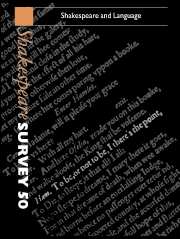Book contents
- Frontmatter
- Shakespeare’s Language and the Language of Shakespeare’s Time
- ‘I’ll plague thee for that word’: Language, Performance, and Communicable Disease
- The Language of the Spectator
- Marlowe’s Edward II: Penetrating Language in Shakespeare’s Richard II
- Hamlet’s Ear
- Secrecy and Gossip in Twelfth Night
- Shakespeare Rewriting Ovid: Olivia’s Interview with Viola and the Narcissus Myth
- ‘Voice Potential’: Language and Symbolic Capital in Othello
- Household Words: Macbeth and the Failure of Spectacle
- Erring and Straying Like Lost Sheep: The Winter’s Tale and The Comedy of Errors
- The ‘Shakespearian Gap’ in French
- Reading the Early Modern Text
- Shakespeare and the Metamorphosis of the Pentameter
- Rereading Illustrations of the English Stage
- Nietzsche’s Hamlet
- ‘Strange and woonderfull syghts’: The Tempest and the Discourses of Monstrosity
- Shakespeare Performances in England, 1996
- Professional Shakespeare Productions in the British Isles, January–December 1995
- 1 Critical Studies
- 2 Shakespeare’s Life, Times, and Stage
- 3 Editions and Textual Studies
- Books Received
- Index
Nietzsche’s Hamlet
Published online by Cambridge University Press: 28 March 2007
- Frontmatter
- Shakespeare’s Language and the Language of Shakespeare’s Time
- ‘I’ll plague thee for that word’: Language, Performance, and Communicable Disease
- The Language of the Spectator
- Marlowe’s Edward II: Penetrating Language in Shakespeare’s Richard II
- Hamlet’s Ear
- Secrecy and Gossip in Twelfth Night
- Shakespeare Rewriting Ovid: Olivia’s Interview with Viola and the Narcissus Myth
- ‘Voice Potential’: Language and Symbolic Capital in Othello
- Household Words: Macbeth and the Failure of Spectacle
- Erring and Straying Like Lost Sheep: The Winter’s Tale and The Comedy of Errors
- The ‘Shakespearian Gap’ in French
- Reading the Early Modern Text
- Shakespeare and the Metamorphosis of the Pentameter
- Rereading Illustrations of the English Stage
- Nietzsche’s Hamlet
- ‘Strange and woonderfull syghts’: The Tempest and the Discourses of Monstrosity
- Shakespeare Performances in England, 1996
- Professional Shakespeare Productions in the British Isles, January–December 1995
- 1 Critical Studies
- 2 Shakespeare’s Life, Times, and Stage
- 3 Editions and Textual Studies
- Books Received
- Index
Summary
It was not until the nineteenth century, whose speculative genius is a sort of living Hamlet, that the tragedy of Hamlet could find such wondering readers.
Emerson, 'Shakespeare; or, the Poet'[W]hoever would become light and a bird must love himself... only man is a grave burden for himself! That is because he carries on his shoulders too much that is alien to him. Like a camel, he kneels down and lets himself be well loaded. Especially the strong, reverent spirit that would bear much: he loads too many alien grave words and values on himself, and then life seems a desert to him.
Nietzsche, Thus Spoke ZarathustraI don't want to be confounded with others - not even by myself.
Nietzsche, Ecce Homo: How One Becomes What One IsNietzsche's thinking about Hamlet goes beyond the brilliant, glancing remarks in The Birth of Tragedy and is bound up with the deepest themes of his philosophy. His ideas, moreover, have influenced twentieth-century criticism of the play, especially that which is troubled by the Ghost and which may even find something positive in Hamlet's not immediately setting to work and dispatching Claudius. This essay attempts to explore some of the ways Hamlet mattered to Nietzsche. Like Coleridge, and many others who have identified with Shakespeare's Prince, Nietzsche seems to have used Hamlet to interpret his own life. And his views on Fevenge, I will argue, illuminate a central issue of the play.
- Type
- Chapter
- Information
- Shakespeare Survey , pp. 171 - 186Publisher: Cambridge University PressPrint publication year: 1997
- 1
- Cited by

